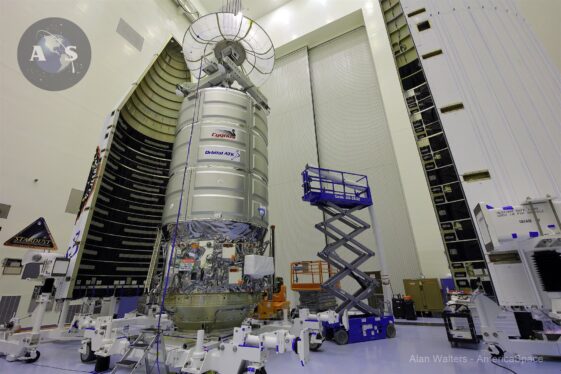4 min read
NASA Seeks Development of Universal Payload Interface

NASA is calling on innovators to help solve some of the challenges in rapidly testing technology payloads across a wide range of commercial flight vehicles and test environments. As NASA explores the unknown in air and space, the agency is making increased use of commercial suborbital vehicles, spacecraft, and lunar landers to help advance new capabilities. However, the process to ensure payloads can properly interface with a host vehicle is currently complex, time-consuming, and can vary greatly from vehicle to vehicle, as well as between suborbital flights, orbital flights, and beyond.
To change the pace of space by moving technologies into flight testing and between different flight environments as quickly as possible, NASA’s Flight Opportunities program is asking businesses, academic institutions, entrepreneurs, and other innovators to develop a flight-ready universal payload interface for its third NASA TechLeap Prize.
The NASA TechLeap Prize’s Universal Payload Interface Challenge invites applicants to propose an optimized “system of systems” to enable easy integration of diverse technology payloads onto various commercial suborbital vehicles, orbital platforms, and planetary landers. The proposed universal payload interfaces should seamlessly adapt a wide range of small space payloads – be they technologies, laboratory instruments, or scientific experiments – for flight testing.

A maximum of three winners will receive up to $650,000 each to build their system plus the opportunity to flight test it at no cost. The focus is on achieving a simplified and streamlined payload integration process that has the potential to accelerate future flight-testing timelines.
The challenge with payload integration is the variety of vehicles used for flight testing, such as the commercial suborbital rocket-powered vehicles and landers, high-altitude balloons, and aircraft flying parabolic profiles that Flight Opportunities uses. The program also works in close cooperation with the Small Spacecraft Technology programto offer access to platforms hosting payloads in orbit.
“The TechLeap Prize is a great way to engage the greater community to find a solution for payload integration that will reduce the time to flight test and ultimately accelerate the development of technologies that are critical for addressing key gaps for NASA and the nation,” said Danielle McCulloch, program manager for NASA’s Flight Opportunities program, which is managed at Armstrong Flight Research Center in Edwards, California. “This has the potential to be a huge step forward for advancing space exploration and expanding the space economy.”
Reducing the cost and complexity of payload integration will support future missions. Facilitating the operations and safety of disparately designed and developed payloads and ensuring that they function across a variety of vehicles is critical.
Through this challenge, NASA aims to find affordable and easy-to-use solutions that enable the rapid transition of payloads from the bench to integration for testing on a wide range of commercial flight vehicles.
Apply to the Universal Payload Interface Challenge
Registration deadline: February 1, 2024, at 5pm ET
Application deadline: February 22, 2024, at 5pm ET
To register, apply, review the technical details, and read the rules, visit the TechLeap Prize website.

About the NASA TechLeap Prize
The NASA TechLeap Prize, funded by NASA’s Flight Opportunities program, was initiated to rapidly identify and develop technologies of significant interest to the agency through a series of challenges. This is the third challenge conducted as part of the NASA TechLeap Prize. Past challenges include Autonomous Observation Challenge No. 1 and Nighttime Precision Landing Challenge No. 1.
Flight Opportunities, part of NASA’s Space Technology Mission Directorate (STMD) helps space technologies reach maturity more quickly by testing them on suborbital flights as well as on hosted orbital platforms, which are available in cooperation with STMD’s Small Spacecraft Technology program. These flight tests can provide critical data and insight into how a technology is expected to perform in its intended space environment, as well as help reduce risk prior to much more costly missions. The NASA Tournament Lab, part of the Prizes, Challenges, and Crowdsourcing program within STMD, manages the TechLeap Prize, which is administered by Carrot.










